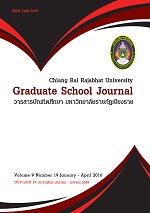การศึกษาวัฒนธรรมองค์การของหน่วยงานในสังกัดสำนักงานส่งเสริมการศึกษานอกระบบและการศึกษาตามอัธยาศัยจังหวัดนครสวรรค์
Main Article Content
Abstract
ผลการศึกษา พบว่า วัฒนธรรมองค์การของหน่วยงานในสังกัดสำนักงานส่งเสริมการศึกษานอกระบบ และการศึกษาตามอัธยาศัยจังหวัดนครสวรรค์ โดยภาพรวมและรายด้านอยู่ในระดับมาก เรียงเฉลี่ยรายด้าน จากมากไปหาน้อย ได้แก่ ด้านวัฒนธรรมแบบมุ่งผลสำเร็จ รองลงมาคือ ด้านวัฒนธรรมแบบเครือญาติ ด้าน วัฒนธรรมแบบราชการ และด้านวัฒนธรรมแบบปรับตัว ตามลำดับ และสรุปผล แต่ละด้าน ได้ดังนี้
1. ด้านวัฒนธรรมแบบมุ่งผลสำเร็จ โดยภาพรวมและรายข้ออยู่ในระดับมาก สูงสุด ได้แก่ บุคลากร สามารถคิด พูด และแสดงออกถึงความคิดเห็นของตนเองได้อย่างเต็มที่ ต่ำสุด ได้แก่ มีการร่วมกันวางแผน กำหนดเป้าหมาย พันธกิจของงานที่ทำเพื่อผลสำเร็จของงานที่รับผิดชอบ
2. ด้านวัฒนธรรมแบบเครือญาติ โดยภาพรวมและรายข้ออยู่ในระดับมาก สูงสุด ได้แก่ บุคลากรมี ความรู้สึกว่าสภาพแวดล้อมในการปฏิบัติงานปลอดภัย และเอื้อต่อการจัดการเรียนรู้ ต่ำสุด ได้แก่ ผู้บริหาร รับฟังความคิดเห็นของ ผู้ใต้บังคับ บัญชา รวมทั้งร่วมกันช่วยเหลือสมาชิก
3. ด้านวัฒนธรรมแบบราชการ โดยภาพรวมและรายข้ออยู่ในระดับมาก สูงสุด ได้แก่ นโยบายของ หน่วยงานเน้นที่จะไม่ทำให้เกิดข้อผิดพลาดในการปฏิบัติงาน ต่ำสุด ได้แก่ ผู้บริหารรู้สึกภูมิใจ มีคุณค่าที่ได้ ดูแล ควบคุม ผู้ใต้บังคับบัญชา
4. วัฒนธรรมแบบปรับตัวโดยภาพรวมและรายข้ออยู่ในระดับมาก สูงสุด ได้แก่ บุคลากรจะใช้การ เจรจาต่อรอง พูดคุย ทำความเข้าใจกันในการปฏิบัติงานเพื่อหลีกเลี่ยงความขัดแย้ง ต่ำสุด ได้แก่ บุคลากรมี อิสระในการตัดสินใจในการปฏิบัติงาน
A Study on the Organizational Culture of Offices under Nakhon Sawan Provincial Office of Non-formal and Informal Education
The purpose of this study was to study organizational culture of offices under Nakhon Sawan Provincial Office of Non-formal and Informal Education. The sample of 288 personnel working under the Office of Non-formal and Informal Education in Nakhon Sawan in this study were selected by using Krejcie and Morgan table sampling. Moreover by simple random sampling a total of 165 people was obtained. The tool used in this study was the questionnaire designed to be rated in 5 levels by the personnel. The reliability coefficient was 0.85. The statistics used in this study were percentage, mean and standard deviation. It was found that organizational culture of the offices under Nakhon Sawan Provincial Office of Non-formal and Informal Education was rated as very good holistically and separately. The highest to lowest rates were leading to success culture, family culture, bureaucratic culture and adaptive culture respectively. The following was the conclusion.
1. Leading to success culture: it was rated very good holistically and separately. The topic rated the highest was the personnel were able to fully think, speak and express their own opinions. The topic rated the lowest was planning in team, specifying the goals and the missions leading to succeed at work.
2. Family culture: it was rated very good holistically and separately. The topic rated the highest was personnel felt that work environment was safe and good for learning management. The topic rated the lowest was listening to subordinates of the executives as well as helping the members.
3. Bureaucratic culture: it was rated very good holistically and separately. The topic rated the highest was the organizational policy leading to less errors at work. The topic rated the lowest was the executives felt proud to take care and take charge of subordinates.
4. Adaptive culture: it was rated very good holistically and separately. The topic rated the highest was the personnel negotiated, communicated, and understood each other in working in oder to avoid the conflicts. The topic rated the lowest was personnels felt free to make decisions in working.
Article Details
บทความที่ได้รับการตีพิมพ์เป็นลิขสิทธิ์ของวารสารมหาวิทยาลัยราชภัฎเชียงราย
ข้อความที่ปรากฏในบทความแต่ละเรื่องในวารสารวิชาการเล่มนี้เป็นความคิดเห็นส่วนตัวของผู้เขียนแต่ละท่านไม่เกี่ยวข้องกับมหาวิทยาลัยราชภัฎเชียงราย และคณาจารย์ท่านอื่นๆในมหาวิทยาลัยฯ แต่อย่างใด ความรับผิดชอบองค์ประกอบทั้งหมดของบทความแต่ละเรื่องเป็นของผู้เขียนแต่ละท่าน หากมีความผิดพลาดใดๆ ผู้เขียนแต่ละท่านจะรับผิดชอบบทความของตนเองแต่ผู้เดียว

